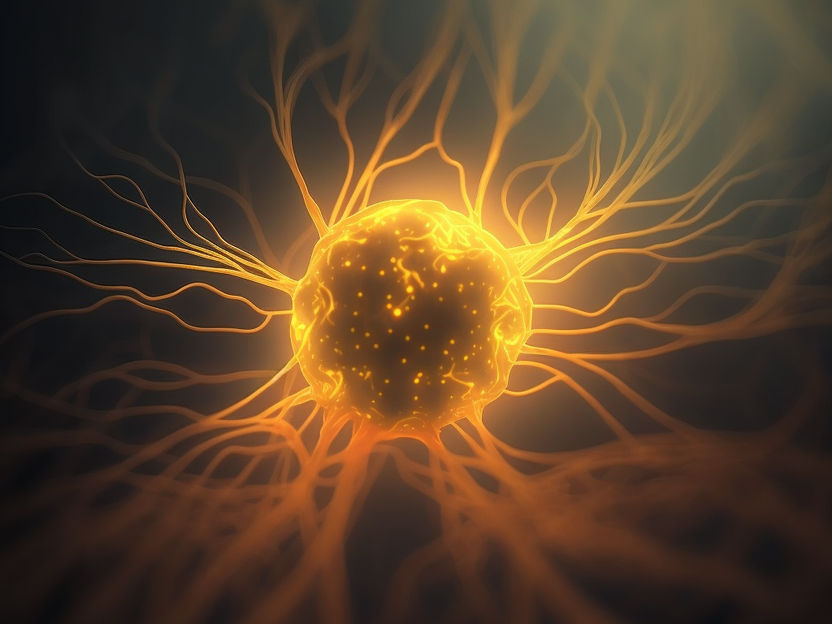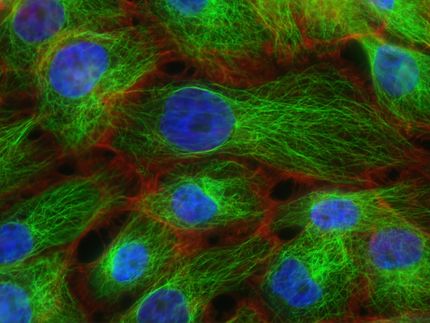Some cancer cells may not be as immortal as previously thought
Researchers use baker's yeast to study potential targets for fighting cancer cells
Scientists at Johannes Gutenberg University Mainz (JGU) and the Institute of Molecular Biology (IMB) in Mainz may have discovered new insights into how cancer cells regulate the ends of their chromosomes, called telomeres. Certain cancers use a specific type of telomere regulation called ALT, which was thought to allow them to become immortal. Professor Brian Luke and his group found that ALT cells may actually undergo senescence, which could mean that they are vulnerable to drugs designed to kill senescent cells. This finding could open the way for new therapies to slow or stop ALT cancer cells from growing.

Symbolic image
Computer-generated image
Cancer remains one of the biggest killers and is among the hardest diseases to treat. The root cause of all cancers is the uncontrolled growth of cancer cells, which multiply rapidly until they form large tumors that spread throughout the body, causing sickness and even death. The reason why cancer cells grow so quickly is in part due to their ability to lengthen the ends of their DNA, which are called telomeres.
When normal, healthy cells divide, the ends of their chromosomes get shorter with each division. Eventually, they get so short that the cell detects a problem and stops dividing. This halt in cell division is called replicative senescence and is an important safety mechanism that prevents cells from becoming cancerous.
Cancer cells circumvent safety mechanism
Cancer cells, however, manage to find ways to circumvent this by lengthening their telomeres, preventing them from shortening. This allows them to keep dividing and proliferate beyond the normal limit, effectively becoming immortal. Most cancers do this by activating a factor called telomerase, which adds more telomeric DNA to the ends of chromosomes, while about 15 percent of cancers activate an alternative mechanism called ALT, short for Alternative Lengthening of Telomeres, where the cell uses its own existing telomeres as a template to make more copies of telomeric DNA.
Previously, scientists thought that ALT allowed cancer cells to become immortal, i.e., that they could grow and divide forever. However, Professor Brian Luke and his team now found in their most recent study that this is not the case. His lab uses baker's yeast to study how ALT works. "Under certain conditions, yeast cells can lengthen their telomeres in a manner nearly identical to ALT cancer cells. We call them ALT yeast," he explained. Stefano Misino, a former PhD student in Luke's lab, added: "We discovered that ALT yeast only appear immortal if we grow them as a mixed population of cells with different telomere lengths. However, when we isolated and grew ALT yeast cells individually, we could clearly see that they started to grow slower and slower after multiple cell divisions." The telomeres in these individual ALT yeast cells also became shorter over time.
This indicates that cells that maintain their telomeres with ALT still undergo replicative senescence, and they may in fact not be immortal. This is an exciting finding because if ALT cancer cells do undergo senescence, they could be treated using new drugs that specifically kill senescent cells.
In addition, Professor Brian Luke and his team found that an RNA molecule called TERRA, which is made at telomeres, can control the rate of senescence in ALT yeast cells and appears to affect how quickly telomeres shorten. He is hopeful that these new findings will pave the way for new strategies to treat cancer. "If we can figure out a way to manipulate the RNA, we could increase the rates of senescence in these ALT cells to slow down or even stop their growth."























































